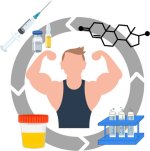Steroid abuse has loomed large over the sports world, putting at risk the fundamental values of fairness, integrity, and athletic excellence. Athletes turning to anabolic steroids and other performance-enhancing drugs (PEDs) in their quest for an advantage have sparked a chain reaction of issues that impact not just individuals, but also institutions and the overall perception of sports on a global scale.
At the core of the matter lies a serious breach of fair play. Sports thrive on the idea that success should stem from talent, hard work, and commitment. When athletes resort to steroids, they gain an unfair edge that completely undermines this belief. Achievements and records set through performance-enhancing drugs are often viewed as illegitimate, raising questions about an athlete’s true accomplishments and tarnishing the sport's legacy.
High-profile doping scandals have taken a toll on the reputations of entire leagues and organizations. From cycling to baseball and athletics, the exposure of steroid use has triggered investigations, led to title revocations, and prompted public apologies. The repercussions of these scandals often ripple out, affecting teams, coaches, sponsors, and governing bodies. The trust in sports institutions takes a hit, and fans start to wonder if the competitions they follow are genuinely authentic.
Health concerns tied to steroid abuse only add to the ongoing crisis. Anabolic steroids can bring about serious physical and mental health issues. In the short term, users might face liver damage, heart problems, hormonal imbalances, and heightened aggression. If used over a long period, the risks escalate to heart disease, infertility, mental health disorders, and even early death. Athletes who opt for steroids not only endanger their own health but also create pressure on clean athletes, who might feel compelled to resort to drugs just to keep up.
This relentless pursuit of performance at any cost sends troubling messages to young, aspiring athletes. When they see professional role models caught using steroids, it can make drug use seem normal and set unrealistic standards. Teenagers, in particular, are especially susceptible to this kind of influence. Some might start using steroids at a young age without fully grasping the risks, which could lead to lasting harm to their physical and emotional well-being.
The financial repercussions for the sports industry are quite substantial. Anti-doping agencies and sports organizations find themselves pouring significant resources into testing, monitoring, and enforcement. Imagine what those funds could achieve if they were redirected towards athlete development, education, or encouraging more people to get involved in sports. When scandals arise, sponsors might withdraw their backing from athletes or teams that have been tainted, and fans who feel disillusioned by these controversies may turn away, resulting in lost revenue and dwindling viewership.
In summary, steroid abuse isn't just a personal issue—it poses a serious threat to the integrity and future of sports. The fallout reaches far beyond individual athletes, impacting the entire ecosystem of the industry, from grassroots participants to global audiences. To tackle this challenge, the sports community needs to wholeheartedly embrace strict enforcement of anti-doping regulations, implement thorough education programs, and foster a cultural shift that prioritizes clean competition over taking shortcuts to success.
At the core of the matter lies a serious breach of fair play. Sports thrive on the idea that success should stem from talent, hard work, and commitment. When athletes resort to steroids, they gain an unfair edge that completely undermines this belief. Achievements and records set through performance-enhancing drugs are often viewed as illegitimate, raising questions about an athlete’s true accomplishments and tarnishing the sport's legacy.
High-profile doping scandals have taken a toll on the reputations of entire leagues and organizations. From cycling to baseball and athletics, the exposure of steroid use has triggered investigations, led to title revocations, and prompted public apologies. The repercussions of these scandals often ripple out, affecting teams, coaches, sponsors, and governing bodies. The trust in sports institutions takes a hit, and fans start to wonder if the competitions they follow are genuinely authentic.
Health concerns tied to steroid abuse only add to the ongoing crisis. Anabolic steroids can bring about serious physical and mental health issues. In the short term, users might face liver damage, heart problems, hormonal imbalances, and heightened aggression. If used over a long period, the risks escalate to heart disease, infertility, mental health disorders, and even early death. Athletes who opt for steroids not only endanger their own health but also create pressure on clean athletes, who might feel compelled to resort to drugs just to keep up.
This relentless pursuit of performance at any cost sends troubling messages to young, aspiring athletes. When they see professional role models caught using steroids, it can make drug use seem normal and set unrealistic standards. Teenagers, in particular, are especially susceptible to this kind of influence. Some might start using steroids at a young age without fully grasping the risks, which could lead to lasting harm to their physical and emotional well-being.
The financial repercussions for the sports industry are quite substantial. Anti-doping agencies and sports organizations find themselves pouring significant resources into testing, monitoring, and enforcement. Imagine what those funds could achieve if they were redirected towards athlete development, education, or encouraging more people to get involved in sports. When scandals arise, sponsors might withdraw their backing from athletes or teams that have been tainted, and fans who feel disillusioned by these controversies may turn away, resulting in lost revenue and dwindling viewership.
In summary, steroid abuse isn't just a personal issue—it poses a serious threat to the integrity and future of sports. The fallout reaches far beyond individual athletes, impacting the entire ecosystem of the industry, from grassroots participants to global audiences. To tackle this challenge, the sports community needs to wholeheartedly embrace strict enforcement of anti-doping regulations, implement thorough education programs, and foster a cultural shift that prioritizes clean competition over taking shortcuts to success.

